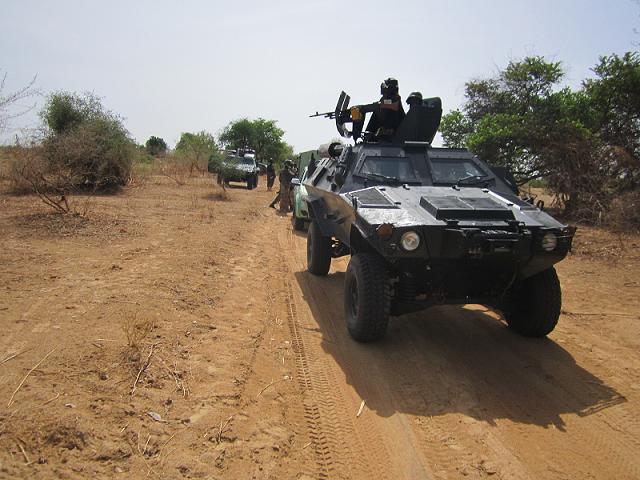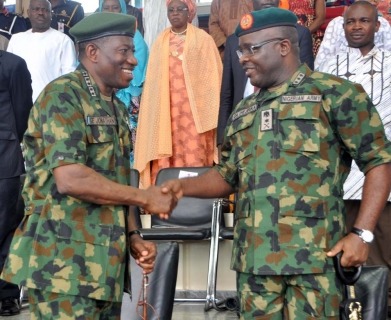2014 is a symbolic year for Nigeria. This year the nation marked its Centenary – 100years since the amalgamation of the Nigerian nation. Today we celebrate the 54th Independence Anniversary. Democratic civil rule in Nigeria has entered its 16th year, more than three times the stretch of time we ever had as a democratic nation state. In spite of all our challenges as a nation: security failings, Boko Haram/insurgency, leadership failures, and collective ineptitude and buck-passing, we have cause to celebrate and to be thankful to God. Even as the nation struggles with various challenges of nation building, learning to celebrate our little successes is a way to keep hope alive, to recognize the few whose efforts are clearly manifest and encourage and challenge all of us to maintain focus and commit to building our dream nation.
I would like to commend President Goodluck Jonathan for using this time to recognize citizens who I believe model the values he wishes Nigerians of all class and callings to emulate in order for his transformation agenda to gain traction. Sharing in the beautiful sentiment of the Centenary, and gladdened as a patriot by the resilience of our joint military forces and the extraordinary sacrifices that they are making to support the political leadership in deepening democracy and safe guarding our country, I dedicate this piece to their praise. Our forgetfulness as a people could be destructive; the nonsensical manner some of our elite have heaped opprobrium on the military of recent is incomprehensible, and unfortunate. For a country where the military has historically seized power through military coups at the slightest opportunity, it makes sense for us to recognize the officers, men and women who for the sake of country are on ‘harm’s way’, and keep vigil for the peace and security of all of us; and continue to shepherd our democracy even with its teething challenges. I am convinced that with the loyalty of the men and women of the armed forces to the civil authority, and the efforts of the military chiefs, led by Air Marshall Alex Badeh, at ensuring professionalism, the nation’s democratic infrastructure will be strengthened to support the transformation expedition.
A people always need to look back to be able to adequately appraise and appreciate their course moving forward. Reflective thinking helps us to make sense of every situation, and make informed decisions. I appreciate the leadership of the Nation’s armed forces, especially the Chief of Defence staff, the three service chiefs, their immediate predecessors, and the principal officers that serve with them for the way they are working to reposition the Nigeria Defense corps and help shepherd our democratic government. I dare say that these men are the best. Their service records speak volumes. Air Marshal Badeh for instance holds a flying record that can compare with the best in the world. His military career spans years of accomplishments – exceptional records in education and trainings and service excellence as commanding officer. He is a professional army man to the core. He is not alone; the Chiefs of Air, Navy, and Army Staff are also sterling officers with enviable service profiles who are committed to transforming the armed forces and are exceptionally loyal to the democratic authorities. Hear Marshal Badeh: “The Armed Forces are defenders of democracy; we are an arm of democracy. So, how can an arm of democracy work against the democracy that we are part of? ….coup plotting is thinking in a negative fashion? … those rumoring coups must be living elsewhere, not in Nigeria.”
History may not be kind to the Nigerian military given their meddlesomeness and misadventures in political governance since 1960. In January, 1966, five years and three months after the Nigeria nation gained its independence, the military displaced the fledging democratic government via a bloody coup. A few months later, it was mutiny, pogrom, and another coup. Power tussle amongst the top rank continued until the military led Nigeria into a civil war that lasted till 1970. Millions of innocent citizens lost their lives. In 1975, there was yet another putsch, then another one in 1996. The military did not spare the Second Republic either. The democratic government of President Aliyu Shehu Shagari only lasted from October 1979 to December, 1983. The military had not learnt from their earlier incursions into politics. They rather seemed to be operating on a warped and power-hungry paradigm, and were thus unable to contain themselves to the barracks. It was as if national political “rulership” had become the calling of our military.
The military ding dong affairs which lasted from 1966 to 1999 cost the nation dearly. The delicate framework that Dr Nnamdi Azikiwe and his colleagues crafted to knit the infant federation of diverse ethnicities together was destroyed. The drama of corruption and power play that accompanied these military misadventures bequeathed the present democratic government with a demoralized military establishment whose esprit de corps had become progressively eroded. It is preposterous to assume that what was left of that coupist and political regiment could sustain a modern and democratic Nigeria. And how on earth can a system grow and develop without time enough to fine tune its architecture and develop the infrastructure.
This background is essential to understanding the transformation that is now taking place, the change the system has undergone, and the sacrifice the present military leaders have and are still making. For many years, our military was a fragmented organization of power chasing cults that specialized in protecting the self interest of the gang in power. The Nigerian elite imbibed the norm that successful military officers are those with deep bank accounts in naira, dollars, euro and pounds – the ex-military administrators, ministers, or heads of state, and their apologists. This cannot be so; professional excellence in the military is rather signposted with ranks, laurels, and scars. The rebuilding of the democratic institutions and defense systems had to start all over in 1998, as what was left of the politically minded military could hardly sustain a modern and democratic Nigeria. This has not been easy.
For Air Marshall Alex Sabundu Badeh, General Kenneth Tobiah Jacob Minimah, Admiral Usman Jibrin, and Air Marshal Adesola Nunayon Amosu, and all the current military leaders, it is time to create a compelling vision for a befitting military establishment to serve the largest black nation on earth. We need an intelligent, purposive, learning-oriented, skillful and highly innovative military establishment that is able to adapt to the ever changing and amorphous security climate locally and across the world. I dare say that resource inelasticity and budgetary constraints cannot and should not limit such an organization. The leadership is expected to constructively develop and deploy strategic networking capacity and collaborative alliances across the globe in building a military that will keep us safe at home and proud within the AU and international community. Boko Haram, insurgency, and oil thievery, as challenging as they may seem, are mere distractions to the major task ahead. Through skills and sacrifices, these nuisances are gradually being contained. I do believe that the immediate goal of returning the country to normalcy will be accomplished soon, so that the military leadership can focus again on the big picture.
We live in a globalized and ever changing world, and the modern military must be guided by organizational protocols that promote human dignity, democracy, and excellence. The new military must be one in which many Nigerians would like to serve, not as a means of livelihood or a way of dominating the populace, but out of a love for their country. The nation deserves a purposeful military with character and an outstanding training and learning culture; a rounded army with knowledge of warfare, security and peace building, and conflict resolution. Our soldiers should be trained to be skilful and disciplined men and women of valor and leadership excellence who represent the best of the Nigerian person.
Finally, I speak to the Nigerian politicians especially those in power today. To make success of any venture in state building requires a sound ethical compass which guides our conducts, directs our actions, and influences our leadership. We should learn to lead with integrity, honesty, humility, and mindfulness at all times. General Powell, one of the most decorated American military leaders, teaches that leadership whether in civilian life or the army, is “do as I do, and not as I say”. Our political leadership must steer clear of the crude and unethical practices and vagabond opulence that characterized some of the previous military regimes. Our democracy, indeed any democracy cannot sustain a situation where governors and their family members become the richest men and women in their various states while still in office. Legislators with business proposals; company profiles in the hallowed chambers; local government executives as stooges of the governors and other political masters; these are ugly practices that are characteristic of ‘banana republics’. As they say, respect is reciprocal; all citizens of Nigeria and the institutions that secure and defend our systems and people desire and deserve respect in its entire ramification from those who have chosen to lead/serve them through the democratic process of nation building. It has been 16 years of uninterrupted civil rule, with a professional and supportive military; Nigeria’s democracy must show some gumption and new foliage that is appealing to all Nigerians and other members of the global community..
It is well with Nigeria; as we observe the Independence Day, let us truly commit to a great Nigeria nation. As we say in ADC: “people first, and politics last will get us there”. God bless Nigeria.
Chief Ralphs Okey Nwosu Ikolo Dike Orabueze Awka, President, StFlairs Legacy Centre & Institute, National Chairman, African Democratic Congress ADC.








